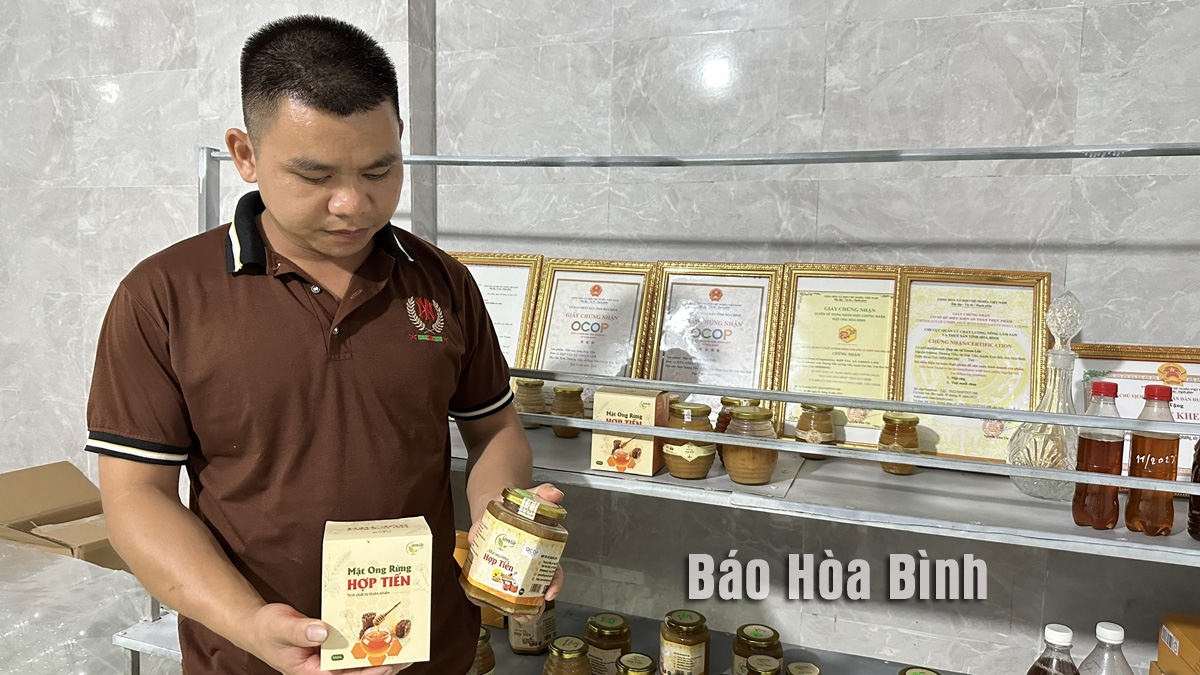
Hop Tien commune’s wild honey product is one of the two first 4-star One Commune – One Product (OCOP) items of Kim Boi district.

Hop Tien wild honey products are produced by Green
Life cooperative, Hop Tien commune, Kim Boi district. The products meets
VietGAP standards, ISO 22000: 2018.
From the 1960s, the locals have used honey in their
daily lives, however, until 2000, beekeeping for honey has become a trade,
helping households improve their incomes.
Dinh Cong Thuan, Director of Greeen Life cooperative,
shared that local honey beekeeping has created jobs for many labourers,
especially young people. Currently, Hop Tien wild honey products are available
across the country and in April, 2024 the products were marketed in the
Republic of Korea (RoK).
Hop Tien commune is located in Thuong Tien Nature
Reserve, coveringmore than 5,000 ha of special-use forest with many
precious medicinal plants. The area is considered an ideal place for honey
beekeeping development. Currently, Green Life cooperative has 11 members and
satellite beekeeping households in hamlets, such as Thuong Tien, Luon, Vang,
and Sim Trong. With nearly 5,800 colonies of bees, Hop Tien wild honey is
well-known for its special and unique flavour and sweetness.
Currently, honey production is 60,000 litres a year, bringing a total income of
more than 12 billion VND (472,000 USD) a year for the cooperative. The
cooperative has invested in machinery systems to help improve production,
ensuring food safety and hygiene. The cooperative’s wild honey products also
meet requirements on exports to the European market.
Bui Thanh Thu, Vice Chairman of the Hop Tien Commune
People's Committee, said that local authorities hope Green Life cooperative to
continue to improve production, aiming to restructure the agricultural sector
in association with new rural buildingin the locality while strengthening
the promotion and introduction of products at trade fairs, supermarkets as well
as both domestic and foreign markets.
Dao Village’s honey – a product certified with a 3-star OCOP (One Commune One Product) rating by Thong Nhat Agricultural Cooperative in Dao Village (Hoa Binh City) – is highly regarded by consumers for its quality, richness, and variety in packaging. The distinctively sweet taste of Dao Village’s honey leaves a lasting impression on anyone who has tried it.
In alignment with Project No. 07-DA/TU, issued by the Hoa Binh provincial Party Committee on November 1, 2021, Lac Thuy district has actively promoted investment and supported the sustainable development of its industrial and handicraft sectors during the 2021–2025 period. Alongside this, the district has remained committed to preserving and revitalising traditional craft villages.
Located in the northern part of Lac Thuy district, with a temperate climate and fertile soil, Phu Thanh commune has great potential and advantages in growing tea. The long-standing experience, combined with strict adherence to organic farming practices in the tea gardens, ensures that the dried tea products from Phu Thanh and Lac Thuy as a whole are sold out immediately upon production, providing a stable and prosperous life for the local people.
Amid efforts to streamline the administrative apparatus, Hoa Binh province has intensified measures to address challenges in land clearance, resettlement support, and infrastructure investment, aiming to speed up the progress of key projects.
Hoa Binh province has posted an unprecedented economic growth rate of 12.76% in the first quarter of 2025, marking its highest quarterly performance to date and positioning it as the second fastest-growing locality in the country, trailing only Bac Giang province.
Under current regulations, products in the One Commune – One Product (OCOP) programme that are rated three stars or higher must undergo re-evaluation every three months. However, in reality, some of these products fail to consistently meet the required standards, raising concerns about the sustainability of their OCOP certification. This underscores the urgent need for producers to enhance product quality and gradually develop their OCOP products into strong, marketable brands.



